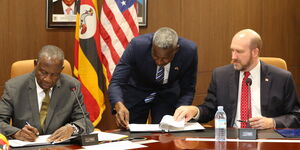President Uhuru Kenyatta on Wednesday, June 3, issued an Executive Order – Organization of Government which has sparked debate amongst lawyers, with some arguing that he has abolished the "sharing aspect" of the presidency with his deputy William Ruto.
The Executive Order issued this week will supersede a prior one of 2018, which was issued by the Office of the President. However, it did not escape notice that Executive Order No. 1 of 2018 was issued by "The Presidency" hence the debate.
The glaring difference between the two orders are in the reference to the office as the 2018 Executive Order also named the officeholders and functions of The Presidency while the 2020 one presents the same under The Executive Office of The President.
“In exercise of the powers conferred by Article 132 (3) (b) of the Constitution, as read with all other enabling Laws, I, Uhuru Kenyatta, President and Commander-in-Chief of the Kenya Defence Forces, order and direct: that this Order supersedes Executive Order No. 1 of 2018 (Revised) issued in July 2018,” reads the document, on its preamble.
The semantics did not escape a debate, with Chief Justice David Maraga stating that the Order was infringing on the independence of the Judiciary.
In government's response, the Attorney General Paul Kihara argued that the president's Order was in no way undermining independent institutions adding that the CJ may have misunderstood the document.
In this article, Kenyans.co.ke, examines the contextual meaning of an Executive Order and how President Kenyatta has invoked them during his administration to help him govern the country.
What's an Executive Order?
An executive order is a signed, written, and published directive from the President that manages operations of the government.
The president derives the powers from the Constitution 2010, Article 132 (3) (b) which empowers the president to: "direct and co-ordinate the functions of ministries and government departments."
According to the Attorney General, Uhuru can restructure the government under the provision.
Executive orders are not legislation; they require no approval from Parliament the House cannot simply overturn them. Only a sitting President may overturn an existing executive order by issuing another executive order to that effect.
President Uhuru Kenyatta's Executive Orders
President Uhuru Kenyatta has instituted the Executive Order a number of times during his two terms as president.
Some have sparked controversy, with legal pundits questioning the legality of the orders.
Waikwa Wanyoike, a High Court advocate in an article published on The Elephant in 2017, faulted the Order under which the president established the Nairobi Metropolitan Area Transport Authority (NAMATA), a multi-billion-shilling agency that is intended to ease traffic and bring order to public transport in the Nairobi metropolitan area.
"Local transport under the constitution is a function of counties. The president cannot take over a function constitutionally given to the counties and direct them on what to do or how to do it. If he does this, he is usurping the powers of the counties, which is illegal," the lawyer opined in his article titled: Executive Disorder: Unpacking Illegal Presidential Directives.
The President has also taken to special occasions to issue the orders for example during the 2015 State of the Nation Address, he directed to the Ethics and Anti-corruption Commission (EACC) and the Director of Public Prosecutions (DPP) to process pending anti-corruption cases within 60 days.
In February 2020, President Kenyatta on Friday established the National Emergency Committee on Coronavirus which was tasked with the role of monitoring the risk posed by the fast-spreading virus in an Executive Order.
While issuing a number of directives, Uhuru appointed Health Cabinet Secretary Mutahi Kagwe to head the team tasked to coordinate Kenya’s preparedness, prevention and response to the epidemic.
The constitutionality of the orders has come into question as well as the president is observed as infringing on the functions of independent bodies.
"The 2010 constitution does not support an all-powerful president. Presidential orders or directives are not supported by the constitution, which is more concerned with the rule of law, good governance, inclusiveness in decision-making and dispersal of state power," Wanyoike stated.
Governors Issuing Executive Orders
Governors too have taken to invoking the privilege in their counties. In January 2019, Nairobi Governor Mike Sonko issued an executive order directing the Nairobi Speaker Beatrice Elachi to issue car loans and mortgages to Members of the County assembly.
His Machakos counterpart, Alfred Mutua in March 2020, issued an executive order while giving details of the universal healthcare plan implementation.
Uhuru's latest order saw the Nairobi Metropolitan Service added as a public office making Nairobi now officially under President Kenyatta. NMS will receive funding for the execution of its mandate from the head of the state's office.
CJ Maraga, AG Kihara Executive Order NO.1 of 2020
While questioning the Executive Order NO.1 of 2020, Chief Justice David Maraga found fault in the inclusion of the Judiciary in the Order stating, "The order cannot restructure or assign functions to other co-equal and co-substantial arms of government and independent commissions. An executive order cannot restructure or assign functions to the Judiciary or the Chief Justice."
AG Kihara responded to critics by affirming that the president had assigned ministries and government departments responsible for inter-agency linkages and liaisons with identified independent constitutional organs and institutions, such as the judiciary and the Judicial Service Commission.
"This does not, by any stretch of the imagination, constitute a restructuring of any independent constitutional organ or institution. Therefore, the statement by the Chief Justice is premised on a misunderstanding of the Executive Order," the AG declared.
Lawyers have pointed out errors in the Order arguing that it is unlawful and unconstitutional.












